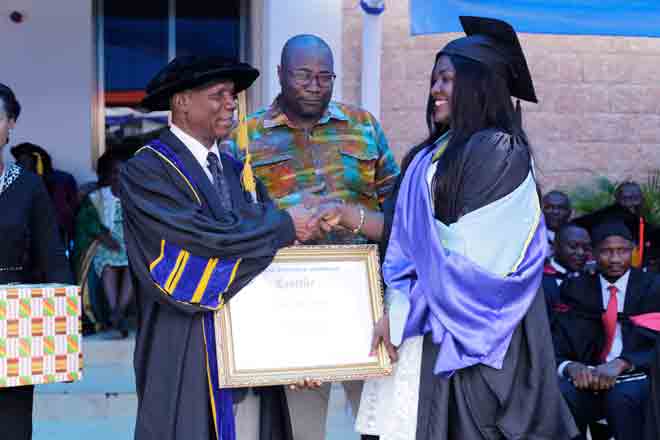The Chief Executive Officer of the Ghana Gas Company, Dr Ben Asante, has urged journalists to develop the passion for reporting on science and technology.
He said some reporters avoided anything science and engineering,with the complaint that those areas were too technical.
He also noted that journalists often preferred subject matter experts to write for publication instead of writing themselves.
“I urge you to write it yourself, make your mistakes and learn from them,” he said at the 2017 Congregation of the Ghana Institute of Journalism (GIJ) in Accra yesterday.
Nine hundred and fifty-four graduates received degrees and diplomas at the congregation that was held on the theme:
“Communication as a tool for sustaining the oil and gas industry.”
Ms Ruth Bazing was adjudged the Overall Best Student in the degree category, while Cynthia Gyan Agyiriba was the Overall Best Student in the Diploma category.
Communication
Dr Asante said communication was an important tool for sustaining the oil and gas industry in the country and conceded that it had indeed kept the oil and gas industry in the limelight.
He, however, described some of the reportage as lacking substance in fact or science.
“You also agree that the oil and gas industry cannot be sustained in an environment of irredeemable ignorance,” he said.
He advised journalists to do investigations in the oil and gas industry themselves and work hard to be abreast of issues in the sector.
“Minimise the ignorance, find the truth. I believe that ignorance is a greater enemy of the truth than a lie, at least the liars know the truth and one day they will tell it, but the person that continues in perpetual ignorance is condemned to professional oblivion forever,” he added.
Dr Asante also advised the journalists to respect other people’s views and not to prejudge people or events.
GIJ expertise
The Rector of the School, Dr Wilberforce S. Dzisah, said the GIJ had the expertise to play critical roles in the development of the country’s oil and gas industry.
“We have a reservoir of human resource in communication to assist in ensuring the development and sustenance of this industry. If we permit those with the requisite knowledge to apply effective communication tools to deal with essential development issues, Ghana’s oil and gas industry could become a model of efficiency for others to emulate,” he said.
He noted that the school was ready to partner organisations and other players in the oil and gas industry by placing its expertise at their disposal.
Dr Dzisah advised the graduates to take advantage of what they had learnt and apply same in a productive way instead of folding their arms waiting for the government to find them a job.
“The job market is virtually being crowded out and it is your responsibility to dream big by becoming employers rather than employees. Continue to challenge yourself and never allow anything or anyone to deter you from achieving your highest ambition in life,” he advised.
Mentorship
For his part, the Chairman of the Governing Council, Professor Kwasi Ansu-Kyeremeh, said the school would fine-tune its internship system to deepen mentoring for improved knowhow.
“We intend to dialogue with industry to strengthen mentoring and to smoothen the transition from the classroom to the workplace.
“We believe these could be our strengths in prevailing against the challenge from the dozens or so institutions currently offering communication programmes all over the country and beyond,” he said.
He indicated that the institution looked forward to developing tracer studios to help guide its future strategies and plans in fulfilling the objective of its creation.

